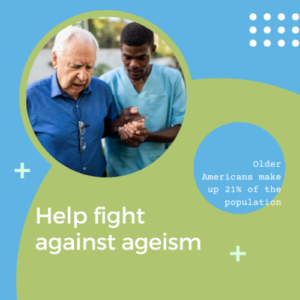 Being mindful of our language, stereotypes, and how we view people is the first step in changing our attitudes toward the way we view and label people. Using more neutral and inclusive language such as “we” and “us” is especially important to help avoid ageism.
Being mindful of our language, stereotypes, and how we view people is the first step in changing our attitudes toward the way we view and label people. Using more neutral and inclusive language such as “we” and “us” is especially important to help avoid ageism.
Ageism is discrimination against older people due to negative and inaccurate stereotypes. Reframing aging is one step toward social change.
The American Medical Association (AMA) provides examples of words to avoid such as the (aged), elder(s), (the) elderly, and seniors. These terms can lead to stereotypes about older people since they can be discriminatory terms with negative connotations. For adults 65+, the recommended term to use is “older adult”.
Public perceptions about older adults tend to focus on a decline in important aspects of self. These include areas such as physical appearance & attractiveness, mobility, and dependence. These attitudes only perpetuate discrimination.
It can be difficult for older adults to escape regularly experiencing ageism in their day-to-day lives. This is because older adults are vulnerable to anti-aging prejudice in the workplace and in their communities. We can see that our society is consumed by anti-aging. Products such as cosmetics and cosmetic procedures are marketed to “fight” aging and to help “appear young”.
Examples of everyday-ageism include the assumption that older people have difficulty with using a cell phone or computer and have difficulty seeing, hearing, and/ or learning information. Assuming that aging adults are a burden, assumptions that physical pain is due to aging, and receiving ageist messages such as jokes about old age, aging, or older people are other examples of ageism. These are unfair, damaging stereotypes that negatively impact well-being and harm physical health and mental health.
Did you know that 8 out of 10 people ages 50 and older report that they experience ageism in their daily lives?
American society tends to be an ageist society that instead of embracing and celebrating aging, tends to devalue individuals as they get older. Older adults are often separated into “other” parts of the community as “they” are approaching the end of life. We want to avoid fatalism and offer solutions.
We are living longer, and older adults are an important demographic within the population. Global health estimates of the average life expectancy were around 73.4 years in 2019. Life-expectancy has more than doubled since 1900 with better aging physical health. Starting in 2030, Baby-Boomers will all be older than age 65.
According to the United States Census Bureau, older Americans will make up 21% of the population. You likely are an older adult or regularly interact with older adults in your homes, workplaces, and communities.
The language that we use to refer to older adults matters. Changing the words and phrases that we use can change attitudes and the stories we convey about aging. Promoting positive views of aging can help older adults feel more comfortable being themselves and have a strong sense of purpose. When referring to older adults, try using words such as “we” or “older people” to incorporate intergenerational community and deter from language that stereotypes.
Let’s join to appreciate and show support for the natural beauty and amazing contributions of our older adults. Let’s also work together to find solutions so that our mental health and healthcare systems are designed to support all of us as we get older, that our communities can embrace our older adults, and that our society continues to challenge assumptions about aging.
Written By: Charlotte Johnson, MA, LPCC
We’re Here to help
Our wellness experts will be happy to take care of you. You can CLICK HERE to schedule an appointment now or call (612)223-8898.
Meet Clinicians
We’re united by our commitment to providing effective, relevant, and innovative mental health support at all stages of your journey. Click Here to find a therapist or find out more about who we are, where we come from, and how we live out CARE’s mission every day.
The professionals at CARE are actively collecting and creating resources to help with what you need and address frequently asked questions. We’re Here for You.



